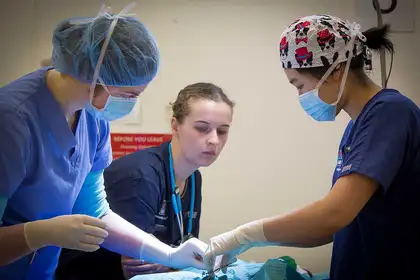
(left) Dr Carolyn Gates with the 500th patient and Bachelor of Veterinary Science students Emily Ball and Juyoung Park.
A Massey University programme that has been providing discounted de-sexing surgeries for community service card holders reached an impressive milestone of 500 surgeries.
The clinics have been running on Saturdays and Sundays at the Massey Veterinary Teaching Hospital since August last year with more than 250 staff and student volunteers involved so far.
Programme coordinator Dr Carolyn Gates decided to set up the clinics up after being involved with a similar initiative while she was a veterinary student at University of Pennsylvania in the United States.
“I wanted to create a similar programme here because I saw how much value there was for the students, cats and community. In a short amount of time, we have made real progress in improving student confidence with basic clinical procedures while also providing a valuable low-cost desexing service to the community.”
SPCA Palmerston North maintain the waiting list of clients and the Massey Veterinary Teaching Hospital provides the facilities and equipment. With more than 150 cats still on the waiting list, it shows no sign of slowing down.
All Bachelor of Veterinary Science (BVSc) and Bachelor of Veterinary Technology (BVT) students can help out in various roles based on their experience level. These range from administrative and assistant roles for first year students (responsible for client communication, patient restraint, and medical record keeping) to anaesthesia and spay surgeon roles for fourth and fifth-year BVSc students.
“Before participating, the students are required to read detailed step-by-step guides outlining the tasks and responsibilities for each role to make sure we are keeping the patients safe at all times,” Dr Gates says. “We have two fabulous student leaders from the BVSc4 [fourth-year Bachelor of Veterinary Science] class, Maggie Gater and Dani Harris, who have done an amazing job preparing the training materials and coordinating the army of volunteers.”
The de-sexing procedures involve basic surgical skills including making an incision, identifying different organs in the abdomen, tying off blood vessels, and suturing the body wall and skin closed. The students practice these skills on simulated models to make sure they are competent before working with live patients. With an experienced teaching vet guiding the students through the entire procedure, there is a very low risk of things going wrong. Most students are ready to go “solo” after about six to nine supervised procedures, Dr Gates says.
“We’re now financially self-sustaining so the programme will continue as long as we have staff volunteers willing to come in on weekends to help teach. We’ll also be keeping a close watch on how much the programme is impacting students and the community.”